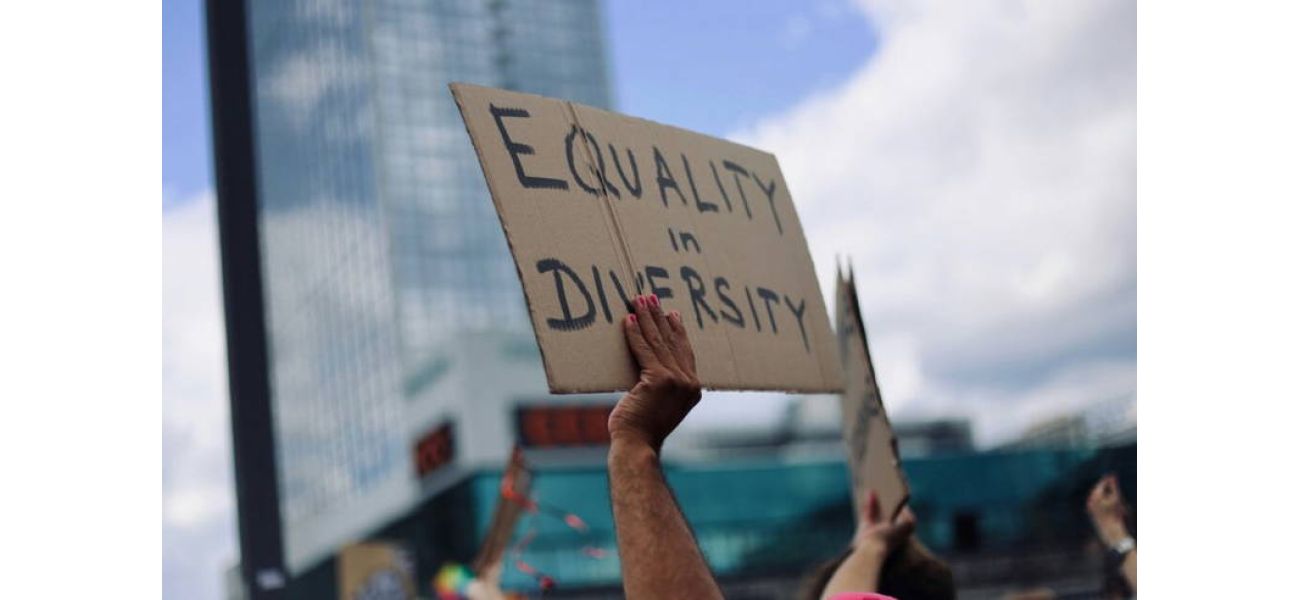The University of Michigan's board did not vote on defunding DEI, but did put an end to diversity statements.
Hundreds gathered on campus on Dec. 5 to protest program's possible cancellation.
December 10th 2024.

According to a recent report from NBC News, the Board of Regents at the University of Michigan faced a crucial decision regarding their diversity, equity, and inclusion program. After investing $250 million in diversity initiatives since 2016, the board was hesitant to vote on defunding the program. However, they did announce that diversity statements would no longer be mandatory for faculty members who were hired or promoted. This news sparked speculation about the future of the DEI program, but board member Michael Behm urged people not to believe everything they read on the internet.
Behm clarified that there were no plans to cut any of the diversity programs, but the decision to remove the requirement for diversity statements caused concern among students, faculty, and staff. On December 5th, over 500 individuals gathered on campus to protest the potential cancellation of the DEI program. When the board did not vote on the program, the students shifted their focus to the decision about diversity statements. Yasin Lowe, a student at the university, expressed frustration with the way DEI has been portrayed as a negative concept, stating that it has been added to the list of buzzwords that are often misunderstood.
Another student, Nicholas Love, challenged the institution to thoroughly examine who they are serving and excluding, and to strive for continuous improvement in access to education and prosperity. However, there are also board members who are eager to eliminate the DEI program and redirect the funding towards students. Mark Bernstein, a board member, believes that the money should go directly to students instead of towards a bloated administrative bureaucracy.
The Black students at Michigan have criticized the DEI initiatives, calling them superficial and claiming that there is a general discomfort with explicitly addressing Blackness. Princess-J'Maria Mboup, a spokesperson for the Black Student Union, stated that while marginalized communities are invested in the work of DEI, they are not invested in the program itself.
The issue of DEI has been a topic of controversy for years, with former President Donald Trump vowing to reduce its presence at colleges that receive federal funding. Some states, such as Texas and Florida, have even banned DEI programs at their state-funded universities. At Michigan, physics professor Keith Riles has called for the elimination of all DEI programs, labeling them as discriminatory. He has also expressed his disapproval of the Black Lives Matter movement, referring to it as a "grift."
In 2022, a report from The New York Times revealed that students and faculty members reported a less positive campus climate compared to when the DEI program first started, and that there was a decrease in the sense of belonging among individuals. Despite these challenges and criticisms, DEI continues to survive and evolve, with the help of artificial intelligence and employee skill sets. As the university grapples with the decision of whether to defund the program, the future of DEI at the University of Michigan remains uncertain.
Behm clarified that there were no plans to cut any of the diversity programs, but the decision to remove the requirement for diversity statements caused concern among students, faculty, and staff. On December 5th, over 500 individuals gathered on campus to protest the potential cancellation of the DEI program. When the board did not vote on the program, the students shifted their focus to the decision about diversity statements. Yasin Lowe, a student at the university, expressed frustration with the way DEI has been portrayed as a negative concept, stating that it has been added to the list of buzzwords that are often misunderstood.
Another student, Nicholas Love, challenged the institution to thoroughly examine who they are serving and excluding, and to strive for continuous improvement in access to education and prosperity. However, there are also board members who are eager to eliminate the DEI program and redirect the funding towards students. Mark Bernstein, a board member, believes that the money should go directly to students instead of towards a bloated administrative bureaucracy.
The Black students at Michigan have criticized the DEI initiatives, calling them superficial and claiming that there is a general discomfort with explicitly addressing Blackness. Princess-J'Maria Mboup, a spokesperson for the Black Student Union, stated that while marginalized communities are invested in the work of DEI, they are not invested in the program itself.
The issue of DEI has been a topic of controversy for years, with former President Donald Trump vowing to reduce its presence at colleges that receive federal funding. Some states, such as Texas and Florida, have even banned DEI programs at their state-funded universities. At Michigan, physics professor Keith Riles has called for the elimination of all DEI programs, labeling them as discriminatory. He has also expressed his disapproval of the Black Lives Matter movement, referring to it as a "grift."
In 2022, a report from The New York Times revealed that students and faculty members reported a less positive campus climate compared to when the DEI program first started, and that there was a decrease in the sense of belonging among individuals. Despite these challenges and criticisms, DEI continues to survive and evolve, with the help of artificial intelligence and employee skill sets. As the university grapples with the decision of whether to defund the program, the future of DEI at the University of Michigan remains uncertain.
[This article has been trending online recently and has been generated with AI. Your feed is customized.]
[Generative AI is experimental.]
0
0
Submit Comment





